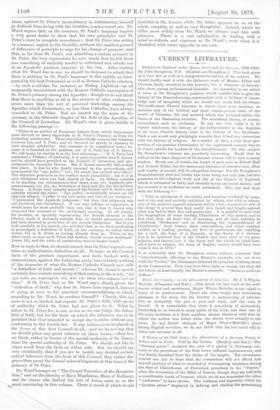CURRENT LITERATURE.
Religion in England under Queen Anne and the Georges, 1702-1800.. By John Stoughton, D.D. (Hodder and Stoughton.) This book gives us a very fair as well as a comprehensive survey of its subject. We should hardly rank it with the elaborate work of Messrs. Abbey and Overton, lately reviewed in this journal ; but it deserves an honour- able place among ecclesiastical histories. Its speciality is one which it owes to Dr. Stoughton's position, which enables him to give the history of the Nonconforming communities with a fullness of know- ledge and of sympathy which we should not easily find elsewhere. We could name Church histories in which there is no mention, or mention only of the briefest and most contemptuous kind, of the world of Christian life and activity which was included within the limits of the Dissenting societies. The sacerdotal theory, of course, necessitates such an exclusion. To any one who holds it in its logical wholeness, the history of the Independents or tho Baptists is no friore Church history than is the history of the Buddhists. Such a one would only grudgingly concede that it had any connection with the history of religion. As a matter of fact, a very large pro- portion of the genuine Christianity of the eighteenth century was to be found outside the borders of the Establishment. On this subject Dr. Stoughton's volumes are peculiarly interesting. Much that he tells us in the later chapters of his second volume will be new to many readers. Every one, of course, has heard of such men as Robert Hall and Andrew Fuller, but the names and histories of obscurer men, often well worthy of record, will be altogether strange. But Dr. Stoughton's Nonconformity does not hinder him from being not only just, but also generous to the religious work and life of the Church of England, which is estimated as fairly and liberally as any one could desire ; and the censure is as moderate as truth permitted. Who can find fault with the following ?- "With an admission of the ability and learning exhibited by some and of the zeal and activity exhibited by others, also with an admis- sion of the pointed reproofs administered by a fow, it cannot be said of the clergy in general that they really met, faced, and fought against what was bad in their day and generation. It is painful to turn over the biographies of some leading Churchmen of this period, and to find that, with all their love of learning, and all their industry in exhibiting 'Evidences,' and in illustrating the reasonableness of Christianity,' their letters, their conversation, and other conduct exhibit, as a leading passion, the love of preferment, the watching for a stall, the hope of a Deanery, or the desire of a diocese. Can it be believed that if the Church had been alive to its great mission, and thrown into it the force and fire which we shall here- after have to witness, the state of English society would have been what it was in 1775."
It is noticeable that Dr. Stoughton writes without comment that "conscientiously adhering to the Master's example, who sat clown. with the Twelve," the Dissenters followed the practice of sitting down at the Communion. They may have been right or wrong, but they did not follow, at least exactly, the Master's example. " 'Arimerro err& Tap






























 Previous page
Previous page